
Hurricanes can be truly devastating. In their wake, they can leave significant wind damage, flooding, loss of utilities, and cause some areas to be inaccessible. When you’re able to return to your home following a hurricane, the experience can be extremely emotional and overwhelming. Even if you find that the damage is not as bad as you had imagined, the road forward can be long and confusing.
In fact, one of the first questions homeowners ask when they begin the process of rebuilding is whether or not their home insurance policy will cover the necessary repairs. The answer can be a little complicated.
As always, please review your insurance policy with a qualified local insurance agent to discuss coverages specific to your policy provisions and situation.
Wind Damage
While wind damage is typically covered by many home insurance policies, it is not covered by all. Some insurance policies partially or completely exclude wind related damage and some may place a specific cap on wind damage or wind damage related to a hurricane.
Flood Damage
Whether the Flooding was caused by the storm surge or the heavy rain that often accompanies a hurricane, home insurance policies do not cover flood damage. Damage caused by flooding requires a specific Flood Insurance Policy provided by the National Flood Insurance Program. What is flood insurance?
Other types of Water Damage
If your property suffers Water Damage unrelated to flooding (say for instance the roof is blown off and water comes in), this damage is typically covered. It is important to keep in mind that your insurance policy also contains a provision that makes you responsible to take steps to prevent additional damage, so depending upon the extent of damage (and the safety conditions to do so), you may need to find a contractor to tarp your roof to prevent additional water from coming in.
Mold
Following a storm event as serious as a hurricane, you may find that you can’t get to your home for some time. Roads can be closed, flooding can take time to recede, and emergency personnel can take time to clear areas for pedestrian traffic. This also prevents contractors from responding to this damage until such time as the area is deemed safe. Once you are able to return to your home, you may find that Mold has already begun to develop. While many insurance policies do offer limited mold coverage in cases where the mold arose from a covered claim, not all do.
High Risk Zones
Properties in areas where hurricane damage is common may find that damage caused by hurricanes is specifically excluded, or covered under different terms from the larger policy. In some cases a specific hurricane endorsement may be required. Even though you may be covered for “wind damage”, you could find that, without a particular endorsement, you are not covered for “wind damage from hurricane”. This can be a bit confusing to the average homeowner, so we recommend seeking out a local insurance agent that can make sure you are adequately covered in the event of a claim.
Hurricane Coverage
Some insurance companies offer special hurricane endorsements or policies that apply only to damage caused by hurricanes. If you’re in an area that is or may potentially be impacted by a hurricane, talk to your insurance agent to ensure that you are suitably protected should hurricane damage occur.
What coverages do I need?
In order to ensure that you are properly covered in the event a hurricane hits, you may need multiple different coverages or policies. Here are a few of the most common coverages that may apply to hurricane damage:
Windstorm Coverage or Endorsement: This coverage applies to damage caused by winds or wind driven rain.
Sewage Backup Endorsement: As the hurricane dumps water on your area, sewage systems can be overwhelmed and may back up into homes. Sewage backup coverage would apply to this damage.
Hurricane Coverage or Endorsement: In high risk zones, you may need to have a specific hurricane endorsement or separate hurricane coverage that would apply to otherwise covered damages caused by hurricane. While you may have windstorm coverage on your primary policy, wind damage that results from a hurricane may be excluded.
Mold Endorsement: Some insurance policies may require a separate mold endorsement to cover mold that results from a covered claim, some may not. Other insurance companies may not offer any mold coverage at all. We strongly recommend homeowners seek out insurance coverage that provides for instances where mold develops as a result of an otherwise covered claim.
Flood Insurance Coverage: Flooding commonly results from a hurricane hitting land and is not covered under standard home insurance policies. A separate Flood Insurance policy, provided by the National Flood Insurance Program and FEMA would be necessary for damages caused specifically from flooding.
Excess Flood Insurance Coverage: Flood Insurance provided through the National Flood Insurance Program maxes out at $ 250,000 in coverage, which may not be enough should your home suffer flood damage. For homeowners that need (or want) the extra security additional coverage provides, Excess Flood Insurance is available through a number of insurance carriers. Please note that Excess Flood Insurance policies require the homeowner to also have Flood Insurance coverage through the National Flood Insurance Program as it is supplemental.
Hurricanes are destructive forces of nature that can be dangerous and unpredictable. With a proper understanding of your insurance policy and the coverages available, you can at least rest easy knowing that you are adequately protected should the worst happen.
While we hope you never experience a hurricane, we hope this information is useful in helping you prepare for one.
As always, should you ever have a need for one of our services, please don’t hesitate to contact your local Disaster Blaster office!
Interested in older news stories? Please see our News Archive.

